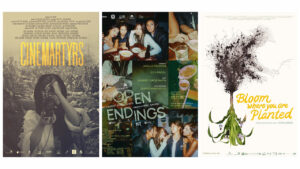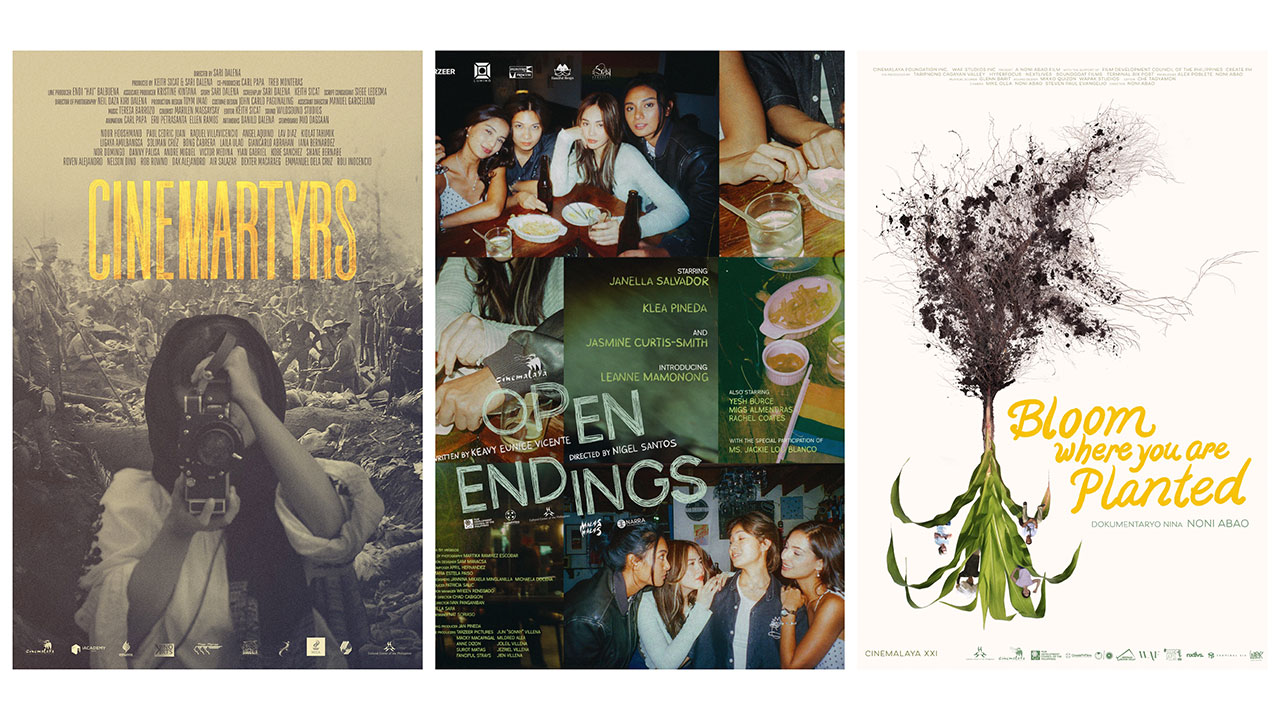
Cinemalaya 2025 Pocket Reviews: From the trappings of the past to musings of the present

By Brontë H. Lacsamana, Reporter
THE 21st edition of Cinemalaya is now at the doorstep of its closing weekend, and BusinessWorld has watched six of the 10 full-length films in competition.
Select malls in Metro Manila — Shangri-La, Gateway, and Ayala Malls (Manila Bay, Market Market, Circuit, and UP Town Center) — are currently screening some of the best local independent cinema has to offer. Compared to mainstream narratives, these films offer reflections of the Philippines’ chaotic past as well as glimpses into its complex present.
Here are reviews of the six films we were able to watch:
BLOOM WHERE YOU ARE PLANTED
Directed by Noni Abao
It’s a testament to the need for truthful perspectives today that the film with the most impact is a documentary.
Bloom Where You Are Planted paints detailed pictures of activists beyond the usual color red that they are associated with, from the lush greens of the land that they help farmers defend, to the bright yellows of the grain that springs from each harvest, to the soft blues of the sky that gently accompany them in their selfless day-to-day with the communities they serve.
These are the little scenes of hope that the state does not want us to see, so that Agnes Mesina, Amanda Echanis, Randy Malayao, and the people around them remain red-tagged as distant, dangerous terrorists in the public eye. It’s an enriching experience to see them as human, as mothers and students, as educators and friends. Their sacrifices are laid out for us to appreciate, their seeds of hope sown through their children, family members, and close confidantes, finally being relayed to reach us as well.
A balance of perspectives to include more of the farmers would have made this an even more well-rounded experience, but it already achieves so much as it is. The direction is truly inspired, the cinematography sure and steady and teeming with life, the editing seamless as it weaves together parallel tales of hope despite struggle, and the sound and score so impactful yet natural in carving out spaces to breathe within the heavy subject matter.
It all manages to cry out, “Activism is not terrorism!” amidst the bleak reality of state repression, but with tender, stunning empathy that will bring tears to your eyes at least two times. For me, one was Amanda’s compelling, heart-wrenching poem that puts us in the shoes of her mother, Erlinda, mourning her slain husband, Randall. The other was the simple yet deeply moving closing shots of the rich landscape of Cagayan Valley and the people protesting in the streets of Manila — seeds of rage and hope blooming and thriving, wherever they are planted.
CINEMARTYRS
Directed by Sari Dalena
Cinemartyrs is a love letter to both the overlooked women of Philippine cinema and the forgotten atrocities during the Philippine-American war, from the perspective of a young director (played with equal parts force and grace by Nour Hooshmand).
There are times when the connections between the two are tenuous, the threads not tying together that neatly, like there are two separate films that could have been made here. An experimental documentary on female Filipino film pioneers from the perspective of a young director would have been cool. A horror-drama about a film crew terrorized by restless spirits after recreating a massacre in Sulu would have been cool, too. Anchoring these historical elements, already very interesting on their own, with an obvious self-insert of the filmmaker weighed down the whole film.
But the ending of the film clues us in on why: director Sari Dalena carved out with striking detail the firsthand Filipino cinephile experience to fully convey the impact of discovering pockets of history to move forward to the future. The 1990s-era film equipment in action, Lav Diaz as Jesus throwing down his cigar before hoisting up a Philippine flag as he faces American soldiers, Kidlat Tahimik’s odd little segment explaining his concept of duwende, Shirin’s mother having an imagined interview with the women pioneers of Philippine cinema — all of these are delicious morsels to take in, individually. It’s just that not everyone is going to like how this boodle fight of historical and cinematic elements tastes altogether.
The most intriguing parts, like the tense filming sequence in Mindanao, the parallel practices of Christianity and Islam in dealing with inexplicable hauntings, and the rare archival footage of female Filipino filmmakers in history, come off as devices in this journey about a woman proving that she can make movies and babies (which, to be fair, is awesome). If only all of it was given more time to cook.
HABANG NILALAMON NG HYDRA ANG KASAYSAYAN
Directed by Dustin Celestino
Hydra follows four Filipinos as they confront the slow erasure of memory and truth in a country devoured by disinformation. It will appeal to a subset of people who feel blindsided, disappointed, and even wronged by the loss of a certain opposition campaign in 2022, but it’s unfair to box it in as mere lamentation.
It’s a film that grapples with the possibility that “being right” has become a subjective and warped notion within a system of disinformation, and the reality that hope can be a source of both power and misery, found externally and internally. Jojit Lorenzo as a campaign manager and Zanjoe Marudo as a speech writer-turned-author are great, but it’s Dolly De Leon and Mylene Dizon who elevate this Greek mythology-inspired tale to an acting masterclass, the former playing a daughter of a desaparecido and the latter a daughter of an infamous general. Any scene with either or both of them in it is electrifying.
The imagery of the Philippines as a mass of people playing out tragedies of Greek myth is arresting, a clear sign that writer-director Dustin Celestino has potential to be a singular voice of our times. What Hydra lacks, however, is authenticity and nuance, its political moralizing so blatant and didactic that the characters and their relationships come across as vehicles for certain ideologies living in a vacuum, and not real people. Its vignette structure essentially forms a journey of post-election reckoning that, again, will be catharsis for a certain subset of middle-class intellectuals.
It’s sharp, entertaining, and intelligent, but I come away from this thinking that these people should really be looking outside of themselves, towards the majority of Filipinos who actually bear the brunt of the suffering.
OPEN ENDINGS
Directed by Nigel Santos
Open Endings is about four queer women in their 30s who are exes-turned-best friends. The film sees them navigate adulthood, love, friendship, chosen families, and everything in between, all while confronting their complex feelings for each other.
This was the most fun time I’ve had at the cinema in a while, surrounded by queer women my age all laughing, shaking their heads, smiling, tearing up, and basically just having a good time seeing their messy selves represented onscreen. Janella Salvador, Leanne Mamonong, Klea Pineda, and Jasmine Curtis-Smith make up such a powerful ensemble, delivering not just enviable looks, but also playful charm and unbridled emotion. The chemistry is there, on all fronts, firing on all cylinders, and we get to sit back and watch these handsome and gorgeous sapphic women dish it out and try (and fail) not to catch feelings.
While there are some pacing and flow issues here and there, Open Endings gives us something really endearing and sweet, beyond the religious guilt and family tension that so many films about the queer experience already portray. There’s the female gaze, the yearning between friends, and the complicated relationships. What kept me from fully enjoying this, though, is how shallow some of it seems to be, with these four women only given a sliver of depth when we see glimpses of them at work or with their families. Much of it is about their crazy friendship and their messy love lives. But if you’re out to see that kind of fun, raw, queer story onscreen, then you’re in for a treat.
PADAMLAGAN
Directed by Jenn Romano
Padamlagan, which translates to Night Light, is an all-Bicolano film that is set five days before the proclamation of Martial Law. It centers on Doring (played by first-time lead film actor Ely Buendia, best known as the lead singer of the Eraserheads), a quiet Peñafrancia devotee who must reckon with the disappearance of his son as the Colgante Bridge collapses in their hometown of Naga. In his desperate search, his eyes are opened to the injustices that Filipino people bear.
First-time director Jenn Romano gives this an admirable effort. The analog elements bring 1972 Naga City to life, from the archival photographs paired with detailed, harrowing, real-life accounts of the Colgante Bridge disaster, to the crackle of radio soundbites that clue us in on the sociopolitical turmoil brewing beneath the bucolic facade of this bustling province. The rest of the film is a quiet, heartfelt, and heartbreaking meditation on the little truths that we uncover — always a bit too late — that wake us up from a slumber of blind obedience and devotion. To have a famous yet laidback OPM icon take on this subtle portrait of a father pushed to express discontent in the search for his missing son is an interesting choice. Buendia’s naturally distinct features add pathos to the role, but it’s clear a more experienced actor could have given it more power and nuance.
The film easily resonates with audiences in how it bemoans the unending cycle of bad governance that besets the Philippines. Deliberate shots, framed through windows and doorways, coax us to ponder Doring’s internal journey towards finding his son amidst the chaos. Limited by its pensive pace, it could have packed more of a punch, but its heart can be felt — after all, his struggle to speak out mirrors our own nation’s struggle to speak out.
Through this intimate look at a preventable disaster taking place around the time of declaration of Martial Law, Padamlagan forces us to confront the realities that have made tragedies like this possible. Ultimately, its strength is textured authenticity, weaving personal trauma with collective memory.
WARLA
Directed by Kevin Z. Alambra
Warla is about a group of transgender women belonging to a gang that kidnaps foreign men to fund their gender-affirming surgeries. This tale is a commendable attempt to represent different facets of the trans experience, but at times it strained a bit under the weighty burden of the representation it was clearly trying to carry.
The main character we follow is Kitkat (played with spirited and often heartbreaking ease by Lance Reblando), each point in her journey obviously there to tick the boxes of various trans struggles. We go from hate crime to family disownment to deadnaming to trans parenting to crumbling relationships all within the first half hour, like a crash course in what it’s like to be trans in a world that is cruel to them. By the time the main cast of characters all get together in a drinking session, it’s a relief to see some levity from their misery. This, among other little scenes where they are free to be themselves, gives us a powerful glimpse at the hearts that beat beneath their beautiful faces and bodies.
A stellar cast backs up Reblando — KaladKaren delivers yet another outstanding, multifaceted performance while Serena Magiliw and Valeria Kurihara portray their respective characters with such propulsive intensity. Since this is based on a real-life group of transwomen who did commit these crimes, the environment informs their outlook, uncertain and meandering and hazy as it may seem across paved streets, unfriendly establishments, growing urban sprawl, and flowing rivers. They are motivated by their families, by their lovers, by their own sense of self-actualization.
It’s a shame that the film’s structure ultimately dwells more on their struggles and their crimes rather than the totality of their being. While we do leave the film supporting the call to protect the dolls, it would have been more effective to depict the larger societal forces at play that cause people to shun them, so that the message would be stronger coming out of this.



